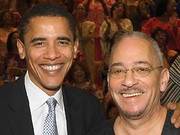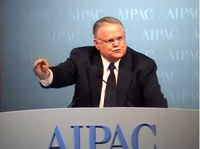No matter how we feel about "phony" controversies they usually have an important point behind them.
They define the limits of acceptable speech.
Take the Jeremiah Wright mess, which Bill Moyers is still agonizing over. Why is Wright condemned for statements like "God Damn America" while preachers like John Hagee, who (along with Falwell and Robertson) said the exact same things (only with different reasons) go merrily on. Isn’t that a double standard?
Well, yes and no.
It’s a double standard in that one man’s speech is seen as out of bounds and another man’s speech is seen as within bounds. True. But the whole purpose of the exercise was to define the bounds of acceptable political speech. It was to make Wright, and everything he says, out of bounds while enabling extremists on the other side free rein. (Actually, free reign.)
In this, as in other phony controversies over the years, the Right has been masterful. Through this process of phony controversy the acceptable discourse within our society has been pushed ever-more to the right, so it’s becoming impossible to even publicly utter obvious truths. I’d say that’s an important result.
For instance, the following sentence is, politically, completely out of bounds within the American political discourse:
Israel is doing to the Palestinians what Hitler did to the Jews.
If an American politician, or preacher, or academic said those words, or anything like them, they would risk their job and their future, even their physical safety.
Yet the sentence above is common currency in much of the world. In the Arab world, it’s a fairly mild, even innocuous statement. You would be ridden out of the political discourse for questioning it.
By setting boundaries on acceptable speech, acceptable from the pulpit, in the classroom, or on the stump, we define not just the result of policy debates but the debate itself. And this is how we end up running off the political rails once each generation — it becomes impossible to tell one another the truth.
To take this out of the context of today for a moment, consider this statement.
Slavery is evil. Black slaves are people.
In the 1850s such statements branded you an extremist. In terms of the mainstream politics of the day, such statements were completely out-of-bounds. That’s why Abraham Lincoln, when debating Stephen Douglas (not Frederick Douglass, Fox) 150 years ago this year, had to be so careful. He called simply for limiting slavery in territories, most of which were ignoring the question because slavery was non-economic. He was careful not to be seen as an abolitionist and this, as much as anything else, helped lead him toward the 1860 Republican nomination and the White House.
In terms of modern politics, of course, Frederick Douglass’ view is now obvious truth to all, while Stephen Douglas’ idea that some Americans should be held in bondage is anathema.
And so we come to the Wright-Hagee kerfluffle, and another gentleman from Illinois. In a country whose people are running wildly to what is considered the left side of acceptable debate — we hate the Iraq war, we hate the Bush economy, we’re losing tolerance for the rich — Obama feels he must measure his words carefully, and distance himself from his former preacher. At the same time Sen. McCain could seek the endorsement of Hagee, and others whose statements about other Americans are, frankly, eliminationist.
When the extremes of the Religious Right become as out-of-bounds as Wright is today, we will have made substantial progress.
But we’ll also have begun our journey to the other political extreme.












